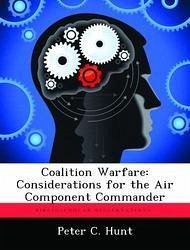Nicht lieferbar

Military-Political Linkage in Coalition Warfare: A Korean Case Study
Versandkostenfrei!
Nicht lieferbar
This monograph examines the linkage between military operations and political goals in the setting of coalition warfare. The next war for the US Army is likely to be fought for limited ends, with limited resources and limited freedom of action. The military commander must be able to plan operations which support the nation's political aims. He must further do so with the scarce resources made available to him and within the restraints placed upon his freedom of action by political decisionmakers. At the same time he must be able to reconcile US goals with those of the other member(s) of the co...
This monograph examines the linkage between military operations and political goals in the setting of coalition warfare. The next war for the US Army is likely to be fought for limited ends, with limited resources and limited freedom of action. The military commander must be able to plan operations which support the nation's political aims. He must further do so with the scarce resources made available to him and within the restraints placed upon his freedom of action by political decisionmakers. At the same time he must be able to reconcile US goals with those of the other member(s) of the coalition within which the US is fighting. The Korean War provides an excellent vehicle for examining the military-political relationships as well as the friction caused by differences within an alliance. The monograph begins by tracing the evolution of US strategy and foreign policy to determine US reasons for entering the war. It then examines the war in four phases. In each phase ROK and US political goals are compared, military operations reviewed, and a determination made as to whether military operations supported the political objectives of that phase. This methodology leads to the conclusion that the failure of the military, notably MacArthur, to understand and/or accept the concept of limited war and the restraints it entails unnecessarily widened and prolonged the war. The implications for the military leader are clear. The link between military operations and political aims must be firmly established and clearly understood. The military must willingly subordinate itself to the political leadership of this country. Failure to do so creates a tension between the military and political elements which must be in harmony. The result is failure in both the political and military realms. Conversely, a balance between the military and political concerns increases the ability of both to succeed.










